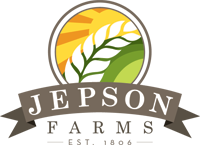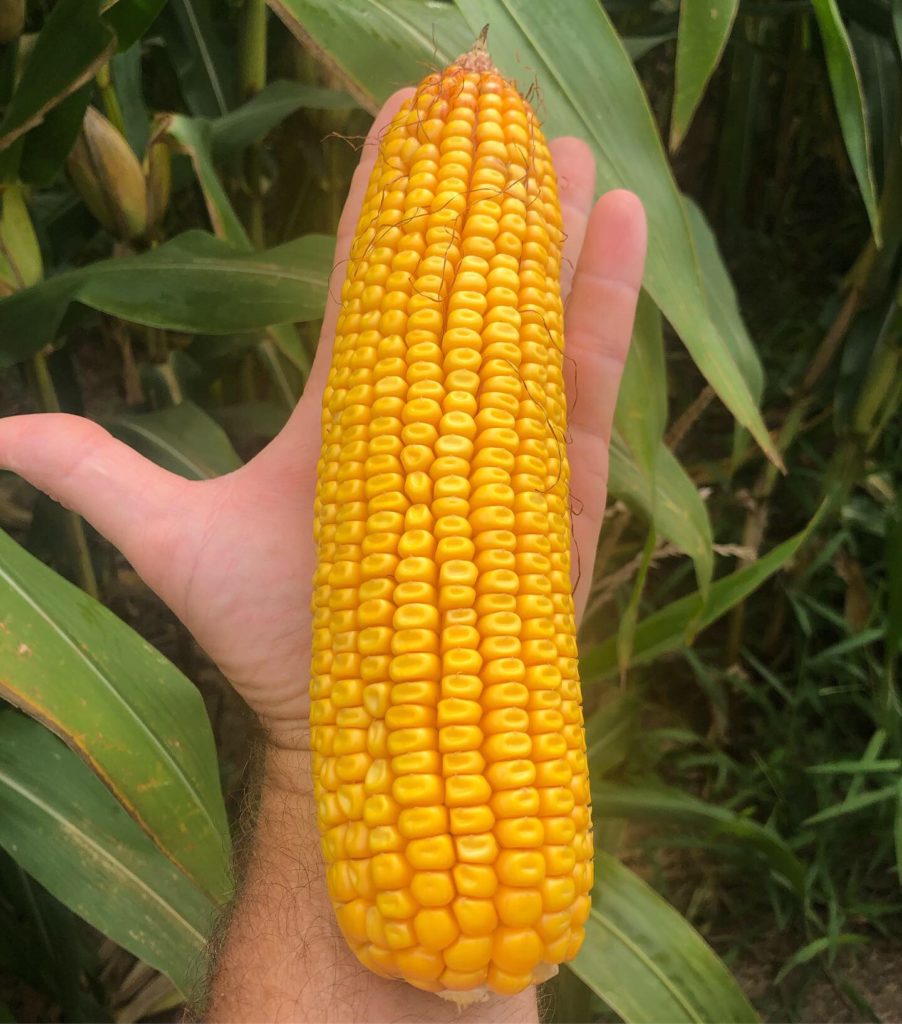
We’ve heard, “Today’s corn plants are more like little pesticide factories with roots.” It’s been proven repeatedly that biotechnology is safe. Bacillus thuringiensis (Bt) proteins used in some genetically modified crops, like GMO-BT corn, manufacture a natural insecticide. In turn, pest challenges are reduced, pesticide use is reduced, and a healthy and safe product is grown. Biotech used to develop seed corn has traits beyond Bt. Herbicide tolerance is another biotech trait, and, more recently, drought-tolerant hybrids have been created using biotech. Not all corn is genetically modified.
Common items containing corn:
- Toothpaste: Sorbitol is an ingredient in toothpaste derived from corn. It helps create toothpaste’s flavoring and texture.
- Yogurt: Uses high-fructose corn syrup as a sweetener; the cows that make the milk also eat corn in their daily meals.
- Gum: Uses high-fructose corn syrup and maltitol as sweeteners and sorbitol for flavoring.
- Cosmetics: Blush and eye shadow often contain zea mays, which is another name for corn.
- Shampoo: Citric acid is a common ingredient in shampoos and conditioners and is derived from corn.
- Diapers: Corn starch is used to soak up moisture in diapers.
- Envelopes: Corn is used to make nitrocellulose glue, which holds envelopes closed so they can be mailed.
- Cornbread: The main ingredient is cornmeal, which gives cornbread its gritty texture compared to other types of bread.
- Handsoap: For many different purposes, at least 25% of the ingredients in some hand soaps contain or were derived from corn.
- Windex: This glass cleaner contains at least 5 different ingredients derived from corn.
- Jellybeans and Licorice: These candies not only include corn syrup of some form to give them their texture but also powdered corn starch is used to coat their molds and allows manufacturers to more easily pop them out after they’re finished being molded.
- Corn Flakes: If you are someone who enjoys a hearty bowl of flakes for breakfast, you’re eating the corn grit that has been steamed and flaked.
- Paper, Recycled Paper, and Cardboard: Industrial corn starch is used during the papermaking process.
- Crayons and Chalk: Utilize industrial corn starch to get them out of their molds and corn products also help the paper labels adhere to the crayons.
- Running Shoes: Currently, most shoes are made with oil-based plastics, but Reebok has announced that it will begin to make the sole of their new sustainable shoe with petroleum-free, non-toxic, industrial-grown corn.
- Spark Plugs: Spark plugs in your car are made from metal and ceramics. When the crystalline structures of cornstarch are heated to very high temperatures, they harden and it becomes a type of ceramic. The ceramic is able to withstand high temperatures and also withstand the corrosive properties of some specific acids.
- Rubber Tires: Instead of using oil-based rubber, Goodyear and their research partner Genencor are using cornstarch to chemically bind the ingredients of its new kind of tire.
- Fireworks: Some of the compounds in fireworks require a “binder” in order to burn properly. A common binder is dextrin, a light carbohydrate most commonly made from corn.
- Popcorn: Popcorn is its own type of corn. There are three common types of corn; sweet corn, popcorn, and field corn. The two we eat in their natural form are sweet corn and popcorn.
- Pet Food: Pet food is regulated to the same level of safety as human food. Corn is used in pet food to create a balanced diet for all kinds of pets including dogs, cats, and even fish.
- Batteries: Corn starch is often used as an electrical conductor in batteries.
- Deodorant: Uses corn starch because of its absorbent nature.
- Hand Sanitizer: Contains ethanol which typically is made by fermenting corn.
- Carpet and Other Textile Products: Corn-based textile products are often preferred to petroleum-based products because they are more environmentally friendly.
- Plastic Products: While it’s not a widespread use as the other products, bioplastic is being used in many different products such as bags, containers, and cups. Corn-based plastics are biodegradable and use up to 68% less fossil fuels during production than traditional plastics and are estimated to emit 55% less greenhouse gases.
- Ethanol: Ethanol is used extensively as a solvent in the manufacture of varnishes and perfumes; as a preservative for biological specimens; in the preparation of essences and flavorings; in many medicines and drugs; as a disinfectant and in tinctures (e.g., tincture of iodine); and as a fuel and gasoline additive (see gasohol). Many U.S. automobiles manufactured since 1998 have been equipped to enable them to run on either gasoline or E85, a mixture of 85% ethanol and 15% gasoline. E85, however, is not yet widely available.
- Whiskey/Bourbon: Fermented corn and other grains are used in the production of alcoholic beverages.
Visit the National Corn Growers Association here »
We sell our corn to the following feed mills
We sell our corn to local ethanol plant, Commonwealth Agri-Energy, and Tennessee Whiskey distiller, Jack Daniels.


